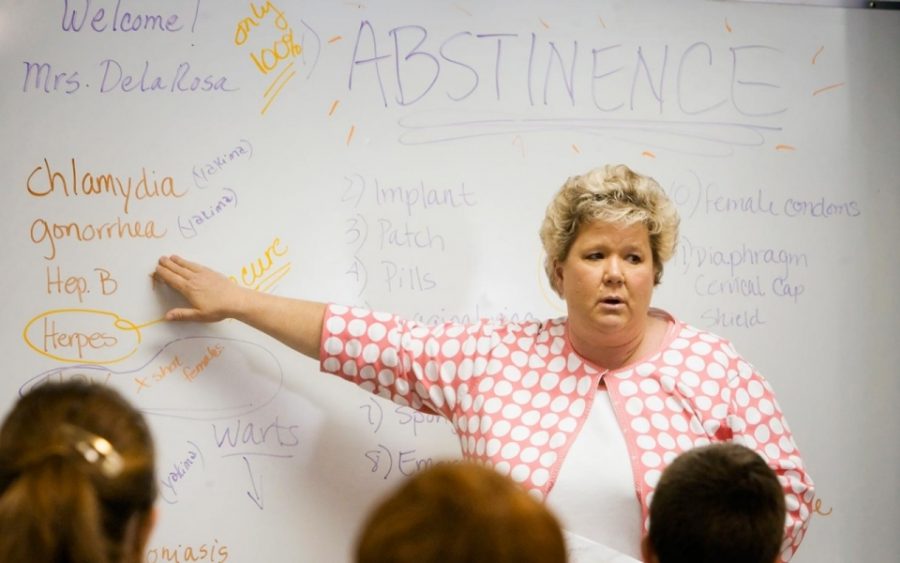Letter to the Editors: Update Sex Education
Andy Sawyer / Yakima Herald-Republic
American sex education programs are grossly outdated and ineffective.
February 8, 2021
Americans like to boast about our military and billionaires, but seldom do we hear those same people talk about how the United States has some of the highest rates of pregnancy, abortion, and sexually transmitted infection rates among teenagers in the Western world. These issues can create strenuous hurdles for teenagers, and debate still simmers over the best way to prevent these issues from occurring. Not only do sex education programs often lack sufficient comprehensive curriculums, but many times the information presented fails to address the experiences and needs of LGBTQ+ teens, ultimately hurting all students.
American sex education dates back to 1912, but it was not until the 1950s that the American Medical Association first advocated for a more well-rounded curriculum; however, by the 1960s, conservative groups and religious organizations raced to dismantle sex education offered in schools, arguing that the information encouraged teens to have sex. Concerned Americans have continued pushing this fallacy despite many studies proving that comprehensive education, extending past abstinence-only education, correlates with declining pregnancy numbers and healthier teens. Because of this, the United States still lacks a federal mandate for sex education. Recently, many have been advocating for more in-depth conversations surrounding sexual health, also aiming to provide accurate and non-discriminatory information to LGBTQ+ teens. With more medically-accurate and unbiased sex education classes, students can strive for healthier relationships.
Improving sex education curriculums by stressing the importance of contraceptives and communication between partners, while also making information more LGBTQ+ inclusive, will aid students in staying safe as they navigate their teenage years.
Comprehensive sex education first advocates for abstinence, but it also provides information on condom usage and other contraceptive methods that reduce chances of pregnancy and the spread of STIs. Studies show that providing students accurate information on reproductive and sexual health result in less unwelcomed situations. Planned Parenthood reports that teens who learned from comprehensive sexuality education courses were 50% less likely to report a pregnancy than those who were only told to stay abstinent. Even with research like that of Planned Parenthood, many still rely on strictly preaching abstinence in schools. When visiting the Netherlands, Justin Lemiller found teachers who not only provide accurate information on contraceptives, but who also focus on the significance of giving and receiving consent. The Netherlands has some of the lowest pregnancy and STI rates, and studies have found that Dutch students are more likely to utilize contraceptives when needed. Implementing the Dutch “Long Live Love” system across the United States would reduce pregnancy, abortion, and STI rates among teenagers while also helping to foster safe and healthy relationships.
However, not only must schools talk about sex, but they also need to escape their heteronormative curriculums and continue the conversation surrounding sexual orientation and gender identity. The GLSEN National School Climate Survey revealed in 2013 that less than five percent of students surveyed had LGBT inclusive sex education at their schools. Failing to supply LGBTQ+ youth with medically accurate information regarding their bodies and relationships is dangerous and discriminatory, but it also nurtures unsafe school climates where LGBTQ+ topics are stigmatized and taboo. Hate crimes and bullying often stem from ignorance, so providing LGBTQ+ sex education would help reduce both in schools.
Although many will argue that strictly promoting abstinence best steers students away from sex, this strategy is often counterproductive and ultimately fails to prepare students of all sexual orientations and genders with the proper materials to ensure healthy teenage experiences. Some argue that teaching safe sex methods will encourage students to engage in sex, but studies prove the opposite. Mathematica’s research indicates that students in abstinence-only courses are just as likely to engage in sex than students in comprehensive courses. Though abstinence-only curriculums fail to make much of an impact, switching to comprehensive education will. Moreover, teaching consent and healthy communication tactics does not encourage sex, but rather promotes consent and healthy communication, ideas that teens can take with them throughout adult relationships. Just like how some believe teaching consent will increase sex, others believe teaching about sexual orientation and gender identity will confuse students; however, excluding certain students from receiving applicable sex education is not only unfair, but more confusing. Updating curriculums to include LGBTQ+ topics will help LGBTQ+ youth feel more comfortable in their schools. All teenagers deserve comprehensive sex education that identifies with their own situations and relationships.
Research proves that LGBTQ+ inclusive, comprehensive sex education is more effective to caution students from sex, but it also gives teenagers the necessary information to protect themselves if they do engage in sexual relationships. Studies back comprehensive education, and it is time for schools across the United States to adopt its methods. We all want our children to be safe and happy, but shielding them from legitimate sex education proves irresponsible, outdated, and detrimental.


































